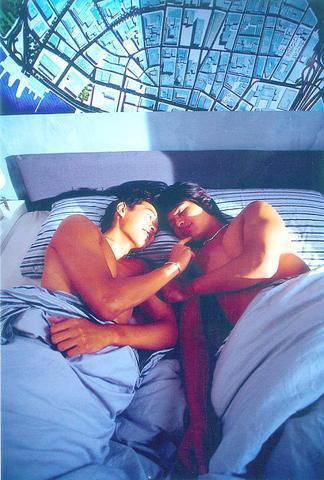If Taiwan's abundant TV soap operas have finally achieved something it is that they have helped create pretty-faced pop idols for the movie Formula 17 (
Formula 17 can be seen as one of those rare finds, not only because it is a gay romantic comedy, but it is also one of the few Taiwanese movies that discards the "tradition" of social realism. It is a commercial drama, sugar-coated with good-looking actors, bright colors, designer fashions and furniture. The movie does not intend to delve into deeper meaning about society or human feelings, as many other Taiwanese filmmakers try to do. As pure entertainment, it is indeed a different breed of Taiwanese movie.
Tien (Tony Yang,

PHOTO COURTESY OF THREE DOTS ENTERTAINMENT
Under the instruction of Yu and his campy friends, Tien learns to dress up and tries a few blind dates. He meets Pai (Duncan), the most chased (gay) bachelor in town and immediately falls for him. But Tien's "sisters" all advise him to stay away from this dangerous attraction, for Pai is a well-known playboy who, unlike the naive Tien, does not believe in love.
Formula 17 is surely trying to create a gay utopian vision of Taipei where there are no women, no heterosexual men, only pretty-looking or muscular gay men in bars, fashion stores or men's gyms. The underlying theme is love and believing in love.
In contrast to many Western gay movies such as The Birdcage or The Adventures of Priscilla, Queen of the Desert, there are no mentions of drag queens or transvestite phenomena, though there are some characters who have exaggerated camp qualities.
The scriptwriter of the movie tries hard, sometimes too hard, to be funny. There are plenty of jokes, but the film director isn't quite able to pull them off. In some of the scenes, the actors look as if they are reading the lines instead of acting.
Fortunately, the good casting and good performances have saved the movie. Tony Yang, Duncan and three actors playing the gay roles have done decent jobs, especially Yang, who shows a different side to his TV drama work. After Formula 17, he could be taking up roles in bigger movies.

April 14 to April 20 In March 1947, Sising Katadrepan urged the government to drop the “high mountain people” (高山族) designation for Indigenous Taiwanese and refer to them as “Taiwan people” (台灣族). He considered the term derogatory, arguing that it made them sound like animals. The Taiwan Provincial Government agreed to stop using the term, stating that Indigenous Taiwanese suffered all sorts of discrimination and oppression under the Japanese and were forced to live in the mountains as outsiders to society. Now, under the new regime, they would be seen as equals, thus they should be henceforth

Last week, the the National Immigration Agency (NIA) told the legislature that more than 10,000 naturalized Taiwanese citizens from the People’s Republic of China (PRC) risked having their citizenship revoked if they failed to provide proof that they had renounced their Chinese household registration within the next three months. Renunciation is required under the Act Governing Relations Between the People of the Taiwan Area and the Mainland Area (臺灣地區與大陸地區人民關係條例), as amended in 2004, though it was only a legal requirement after 2000. Prior to that, it had been only an administrative requirement since the Nationality Act (國籍法) was established in

Three big changes have transformed the landscape of Taiwan’s local patronage factions: Increasing Democratic Progressive Party (DPP) involvement, rising new factions and the Chinese Nationalist Party’s (KMT) significantly weakened control. GREEN FACTIONS It is said that “south of the Zhuoshui River (濁水溪), there is no blue-green divide,” meaning that from Yunlin County south there is no difference between KMT and DPP politicians. This is not always true, but there is more than a grain of truth to it. Traditionally, DPP factions are viewed as national entities, with their primary function to secure plum positions in the party and government. This is not unusual

US President Donald Trump’s bid to take back control of the Panama Canal has put his counterpart Jose Raul Mulino in a difficult position and revived fears in the Central American country that US military bases will return. After Trump vowed to reclaim the interoceanic waterway from Chinese influence, US Defense Secretary Pete Hegseth signed an agreement with the Mulino administration last week for the US to deploy troops in areas adjacent to the canal. For more than two decades, after handing over control of the strategically vital waterway to Panama in 1999 and dismantling the bases that protected it, Washington has